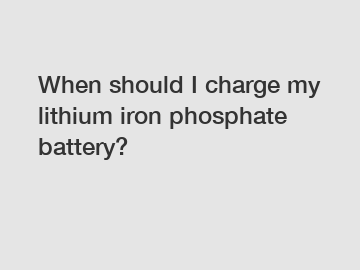When should I charge my lithium iron phosphate battery?
When should I charge my lithium iron phosphate battery?
Charging a lithium iron phosphate (LiFePO4) battery is an important aspect of its maintenance, as it directly impacts its performance and longevity. The ideal charging time for LiFePO4 batteries differs from other types of batteries, such as lead-acid batteries. In this article, we will explore when to charge a LiFePO4 battery, the reasoning behind it, and the significance of adhering to the recommended charging methods.
LiFePO4 batteries have a different charging characteristic compared to other batteries. Unlike lead-acid batteries that require frequent topping up, LiFePO4 batteries should not be left in a discharged state for an extended period. It is recommended to recharge LiFePO4 batteries as soon as possible after discharging them, ideally within 24 hours.

The reasoning behind this recommendation is rooted in the chemical composition and internal structure of LiFePO4 batteries. These batteries are known for their superior energy density, long cycle life, and excellent thermal stability. However, if LiFePO4 batteries are left in a discharged state for a prolonged period, the electrochemical reactions within the battery can lead to undesirable side reactions, such as the formation of lithium plating or dendritic growth. These side reactions can reduce the battery's capacity, compromise its performance, and even lead to safety hazards.
To avoid these issues, it is crucial to recharge LiFePO4 batteries promptly after discharging them. This ensures that the battery remains in a stable state, preventing any side reactions from occurring. By adhering to this recommendation, users can maximize the lifespan and performance of their LiFePO4 batteries, ultimately reducing long-term costs and the need for premature replacements.
It is worth noting that LiFePO4 batteries are not susceptible to the "memory effect," a phenomenon commonly associated with older battery technologies. The memory effect occurs when a battery is repeatedly charged without being fully discharged, resulting in a decrease in the battery's overall capacity. However, LiFePO4 batteries do not exhibit this memory effect and can be recharged at any state of charge without causing significant capacity loss.
In conclusion, it is crucial to charge a lithium iron phosphate battery as soon as possible after discharging it. This recommendation is based on the battery's chemical composition and internal structure. By avoiding prolonged discharged states, users can optimize the performance, maximize the lifespan, and ensure the safety of their LiFePO4 batteries. Adhering to this charging practice will ultimately result in cost savings and a more sustainable use of energy storage systems.
For more information, please visit ncm battery, lithium 3.2 volt battery, lithium ferro phosphate battery pack.
184
0
0


Comments
All Comments (0)